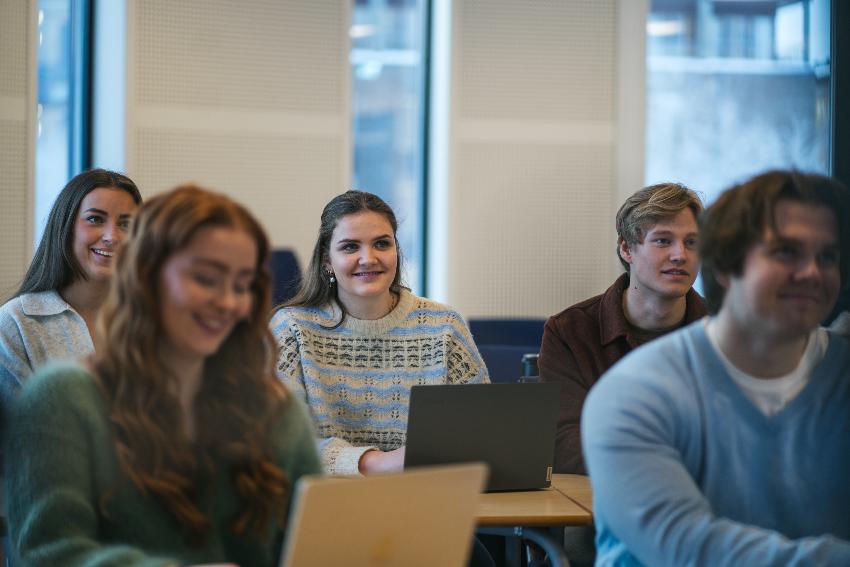The Master's Programme in English Literature provides a comprehensive study of literature from across the English-speaking world. Courses highlight how literature shapes and is shaped by history; its relevance for contemporary issues such as climate change, migration and social justice; and its ability to challenge and refine a reader's ways of thinking. Building on a diverse range of critical approaches, the programme helps students refine their abilities to think analytically and creatively.
The study program is offered physically in Tromsø, but lectures and exams can also be followed digitally.
Bachelor's degree (180 ECTS), or equivalent qualification, in English literature, or a degree combining English literature and a closely-related discipline (minimum 80 ECTS in English).
Applicants need an average minimum grade of C or better from the bachelor's degree to be admitted to the master's program.
Applicants with education from non-Nordic countries must document English language proficiency.
Admission capacity
15 places
Non-EU students must be prepared to pay tuition fees.
Please note that all questions related to the admission process should be directed to the Admission Office at the university.
- Nordic applicants: 5072
- EU/EEA + Swiss applicants: 7163
- Non-EU applicants: 2055
Program description
The master's programme in English literature gives students the opportunity to study a broad range of literary and cultural texts in English, while specializing in an area of their choice under the leadership of a researcher in that field. The English section can offer supervision in English, Irish, American and post-colonial literatures, and is particularly strong in the areas of romanticism, modernism, and contemporary literature.
Each year, students are offered courses organized around socially-relevant themes, key literary periods and genres, and/or prominent authors. All master's level courses include training in secondary research and literary theory, practice in close analysis, and feedback on students' written work.
In moving from coursework to the master's thesis, students move toward a more specialized focus and more independent research. This research is supported by each student's supervisor and by a series of organized work-in-progress seminars targeting the skills needed for master's-level research.
Learning outcomes
After completing the master's degree in English literature, candidates will have advanced knowledge of English literature across various contexts and periods, with specialized expertise in their thesis area. They can analyze literary texts in relation to history, genre, and socio-cultural debates and engage with diverse theoretical approaches. Candidates are skilled in evaluating literary criticism, conducting independent research, and formulating scholarly arguments. They can communicate complex ideas effectively, apply their knowledge to new areas, and contribute to innovation in the field of English literature.
Job prospectives
English master's candidates possess sought-after analytical and creative thinking skills and are respected for their skills in oral and written communication. A master's degree in English literature prepares students for work in the literary and cultural industries through positions in publishing, journalism, museums, libraries, and bookstores. It also prepares graduates for a wide range of jobs that require culturally-sensitive international communication. The independent work of the master's thesis provides experience relevant for higher positions in the government and in business.
Finally, the programme qualifies students for admission to doctoral programmes in literature, thereby providing possibilities for further research career.
Degree Name
Master of English LiteratureAccess to further studies
On successful completion of the degree programme, students may be qualified for admission to a PhD in English literature.
Related professions
Study plan
Language of instruction
The language of all teaching and examinations is English.
Teaching and assessment
The study program is offered in Tromsø, but lectures and exams can also be followed digitally.
In order to reach the learning goals, students should expect to work 40 hours a week attending and lectures, seminars and studying independently.
The master's thesis requires independent research and writing on a specialized topic chosen by the student in collaboration with a supervisor. Students are expected to anticipate and organize their research and writing tasks and to produce work to be discussed at regular meetings with their supervisor.
Most courses include written assignments or oral presentations that must be approved in order to take the exam.
The most common forms of examination are home exams written on assigned topics over a one-two week period or term papers on topics that students choose in cooperation with course instructor.
For further information about work requirements, exam formats and evaluative criteria, see the individual course descriptions.
Exchange studies abroad will make you more attractive on the job market. Studies abroad will increase your learning outcomes, improve your language skills, give you unique adventures and international experience. Students taking the Master's in English Literature are encouraged to make use of one of our exchange agreements in the second semester.
For an updated overview of exchange universities, please take a look at UiT's webpage on student exchange.
Destinations for studies abroad
Vil du vite hvordan det er å være student ved UiT? Følg @uitstudent på Instagram eller TikTok, hvor studenter deler fra livet på universitetet. Her får du praktiske tips om studier og studentliv, nyttig informasjon om campus og muligheten til å stille spørsmål om alt du lurer på.
For mer informasjon om studietilbud, forskning og muligheter direkte fra UiT, kan du følge @uitnorgesarktiske på Instagram eller TikTok. Her finner du offisielle oppdateringer og innsikt i hva universitetet har å tilby.




